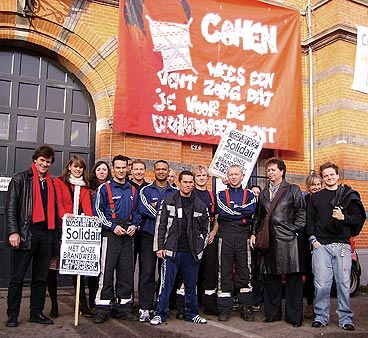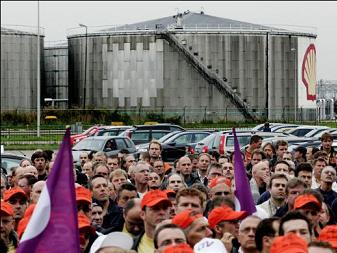When the workers at Visteon plants across the UK were sacked back in March without any pension or backpay they didn’t put up with this, but fought back by occupying the factories, finally forcing the company to honour the agreements it had made when it had taken over the factories from Ford. They didn’t get their jobs back, but they did get the redundancy packages they had a right to. The question now is whether this was a victory or a failure when considered in a larger context. At Socialist Democracy, John McAnulty didn’t think so:
Almost 600 jobs were lost at Visteon’s three plants in Belfast, Basildon and Enfield, with staff being given less than an hour’s notice. At the end of a 34-day occupation the job loss stands, as does the loss of pension rights that the workers contributed to. If the union leadership consider this a victory what would defeat look like?
The unions weren’t alone. Sinn Fein, through their cover sheet the Andersonstown News, had front-page headlines proclaiming a victory for ‘Peoples’ Power.’ At an earlier meeting discussing Visteon, Socialist Workers Party spokesperson Eamonn McCann had claimed that there was no such thing as defeat in industrial struggles – to struggle was in itself a form of victory.
[…]
‘Visteon Victory’ means something different to workers. It means that organisations like the UNITE bureaucracy and the Sinn Fein leadership cannot possibly be considered as useful aids in the battle against capitalism and must be removed from the field of play if workers are to have a fighting chance.
At Socialist unity, Andy Newman disagrees:
The recent Visteon strikes are a good example. In an exemplary show of initiative and militancy the workers occupied in Belfast, Enfield and Basildon, which then became the foci of networks of trade union and community solidarity. It was an heroic and inspirational fight, that blew away the cobwebs of inertia that had greeted the closure of Woolworths, and other job losses.
But before we get too carried away with our assesment of the workforces’ bargaining position, let us consider that Visteon were seeking to close the factories, so the occupations were an interruption to cash flow stopping the selling the assets, but were not hitting their production; and secondly that through the use of threats of courts, police and bailiffs, only Belfast was still in occupation at the time a deal was reached.
[…]
Now it is true that the workforce didn’t get their jobs back, and the pensions issue was unresolved. But what were the realistic chances of getting the factories reopened?
To have done so would have needed a political context where there existed pressure on the government to step in. That is not the current political reality, and occupations by relatively small factories in the recession stricken car industry were not going to be able to change that.
On balance I’d say Andy is more right than John. While it is true that union bureaucracy and leadership does often hold back workers’ militancy, in this case the workers were supported by their union and the result was clearly as good as it could be. What John wants to have happened just was not on the cards. There’s this sort of “fantasy football” idea of the socialist revolution where the workers spontaneously rise up, start doing factory occupations and sweeping aside the deadweight of the cowardly union bureaucracy march into the glorious sunrise of the socialist paradise. What John proposes is the Green Lantern theory of revolution, that as long as the workers have enough willpower they can overcome all obstacles. Real life just doesn’t work that way.
Visteon wasn’t a complete victory, but it was an important step towards victory. It showed us that we can fight the bosses and win, even if it didn’t bring the revolution overnight.

